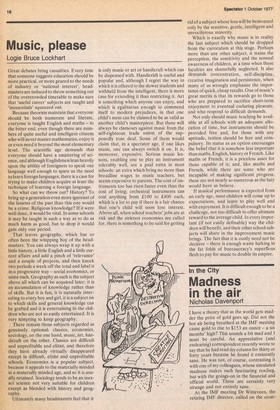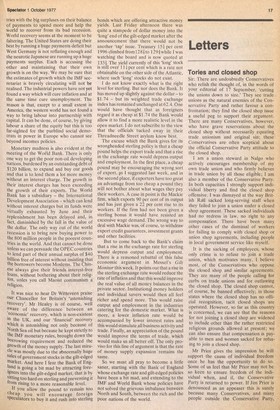In the City
Madness in the air
Nicholas Davenport
I have a theory that as the world gets madder the price of gold goes up. Did not the hot air being breathed at the IMF meeting cause gold to rise to $153 an ounce — a six months' high? This sounds a bit mad and I must be careful. An appreciative (and endearing) correspondent recently wrote to say that he had read my column for thirty or forty years because he found it eminently sane. He was not, of course, contrasting it with one of my colleagues, whose simulated madness makes such fascinating reading, but with the goings-on in the financial and official world. These are certainly very strange and not entirely sane.
At the IMF meeting Dr Witteveen, the retiring IMF director, called on the coun tries with the big surpluses on their balance of payments to spend more and help the world to recover from its bad recession. World recovery seems at the moment to be faltering. The United States are doing their best by running a huge payments deficit but West Germany is not reflating enough and the neurotic Japanese are running up a huge payments surplus. Each is accusing the other and maintaining that their own growth is on the way. We may be sure that the estimates of growth which the IMF secretariat is bravely circulating will not be realised. The industrial powers have not yet found a way which will cure inflation and at the same time cure unemployment. The reason is that, except to a small extent in America, the western world has not found a way to bring labour into partnership with capital. It can be done, of course, by giving labour a share of the equity but this is too far-sighted for the purblind social democrats in power in Europe who cannot see beyond incomes policies.
Monetary madness is also evident at the meeting of the Woild Bank. There is only one way to get the poor non-oil developing nations, burdened by an outstanding debt of $120 billion, to expand and buy our goods and that is to lend them a lot more money Without an interest charge. The growth in their interest charges has been exceeding the growth of their exports. The World Bank has a subsidiary — the International Development Association — which can lend Without interest charges but its funds were virtually exhausted by June and their replenishment has been delayed and, in fact, diminished by the fall in the value of the dollar. The only way out of the world recession is to bring new buying power to the 800 million people in the poorest countries in the world. And that cannot be done unless we can persuade the OPEC countries to lend part of their annual surplus of $40 billion free of interest without insisting that the borrowers become Moslems. The Chinese always give their friends interest-free loans, without bothering about their religion, unles you call Maoist communism a religion.
It was nice to hear Dr Witteveen praise our Chancellor for Britain's 'astonishing recovery'. Mr Healey is of course, well aware of the difference between an .economic' recovery, which is non-existent in the UK, and our 'financial' recovery Which is astonishing not only because of North Sea oil but because he kept strictly to the IMF monetary rules, brought down the borrowing requirement and reduced the growth of the money supply. The last miracle was mostly due to the abnormally huge sales of government stocks in the gilt-edged market. And here I fear the Bank of England is going a bit mad by attracting foreigners into the gilt-edged market, that is by sitting too hard on sterling and preventing it from rising to a more reasonable level. If you allow the pound to remain too cheap you will encourage foreign speculators to buy it and rush into sterling bonds which are offering attractive money yields. Last Friday afternoon there was quite a stampede of dollar money into the 'long' end of the gilt-edged market after the announcement that there would not be another 'tap' issue. Treasury 151 per cent 1996 climbed from128i to 129iwhile I was watching the board and is now quoted at 1331. The yield currently of this 'long' stock is still over 111 per cent which is a rate not obtainable on the other side of the Atlantic, where such 'long' stocks do not exist.
I do not know exactly what is the right level for sterling. But nor does the Bank. It has moved up slightly against the dollar — to $1.74 — but its weighted trade exchange index has remained unchanged at 62.4. One would have thought that as foreigners regard it as cheap at $1.74 the Bank would allow it to find a more realistic level in the open market. I do not subscribe to the view that the officials tucked away in their Threadneedle Street asylum know best.
The excuse which the Bank gives for its wrongheaded sterling policy is that a cheap pound helps the export trade and that a rise in the exchange rate would depress output and employment. In the first place, a cheap pound may be encouraging the wrong sort of export, as I suggested last week, and in the second place, if exporters have too great an advantage from too cheap a pound they will not bother about what wages they pay their workers. A case in point is the Mackie firm, which exports 90 per cent of its output and has just given a 22 per cent rise to its workers. If the firm had not been given a sterling bonus it would have resisted an excessive wage demand. The wrong way to deal with Mackie was, of course, to withdraw export credit guarantees, investment grants and other facilities.
But to come back to the Bank's claim that a rise in the exchange rate for sterling would depress output and employment. There is a reasoned rebuttal of this false economic argument in Messel's Gilt Monitor this week. It points out that a rise in the sterling exchange rate would reduce the rate of inflation and that this would improve the real value of all money balances in the private sector. Institution4 money holders and individual savers would then all feel richer and spend more. This would raise output and employment in the industries catering for the domestic market. What is more, a lower inflation rate would be accompanied by lower interest rates and this would stimulate all business activity and trade. Finally, an appreciation of the pound would improve the terms of trade, which would make us all better off. The only proviso for this line of argument is that the rate of money supply expansion 'remains the same.
So we must all pray to become a little saner, starting with the Bank of England whose exchange rate and gilt-edged policies have been a bit mad, and extending to the IMF and World Bank whose policies have not solved the grievous imbalance between North and South, between the rich and the poor nations of the world.



































 Previous page
Previous page